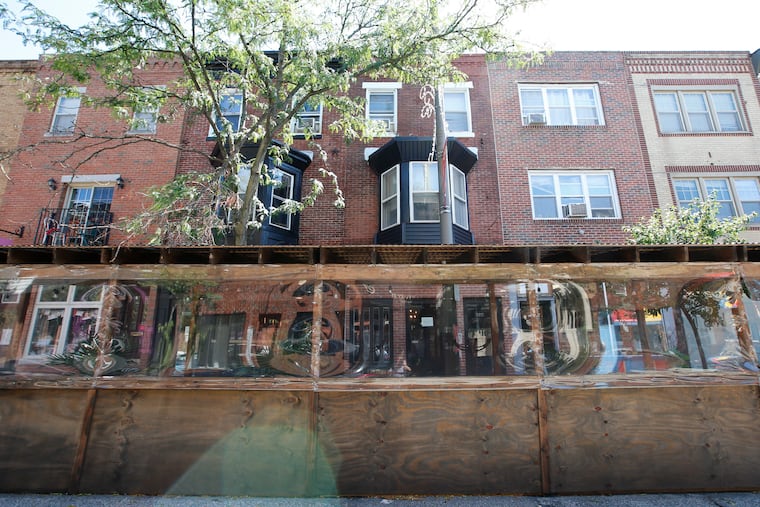Outdoor dining could become permanent in Philly — but only in certain areas
The legislation advanced by a Council committee would make some streeteries permanent, but leave councilmembers in control in other areas.

A Philadelphia City Council committee advanced legislation Tuesday that would make pandemic-era streeteries permanent in certain areas but would force other restaurants to seek Council approval for their outdoor dining structures.
The committee amended proposed legislation to protect Council’s long-standing practice known as councilmanic prerogative, which gives members control over what gets approved in their own districts. Council President Darrell L. Clarke had expressed opposition to an earlier version introduced by Councilmember Allan Domb that would take that power away from Council and create an approval system run by Mayor Jim Kenney’s administration.
The bill advanced Tuesday would authorize streeteries, or dining over parking spaces, in Center City, University City, business districts in Fishtown, Old City, East Passyunk, and Northern Liberties, Main Street Manayunk, and other specific areas. Restaurants outside of those areas would need to get approval through individual legislation, which requires support from their district Council person. Another bill advanced Tuesday would also permit all sidewalk cafes approved during the pandemic to continue operating through 2022.
The legislation was approved unanimously by the committee and will now go to the full Council for a final vote, which is expected before the current outdoor dining approvals expire at the end of the year.
“It is important for those individuals that know these communities best ... to have a pinnacle part and involvement in the location and placement of these,” Clarke told the committee members Tuesday, explaining his effort to protect Council’s authority.
» READ MORE: Should expanded outdoor dining be permanent in Philly? A struggle over who decides is at the center of the debate.
Restaurateurs and other business leaders expressed support Tuesday for the bill Domb introduced in September and said outdoor dining remains critical to their survival. Owen Kamihira, who owns El Camino Real in Northern Liberties, said his business has recently dropped 40% due to the delta variant and the start of cold weather.
“It’s also my hope that additional City Council actions won’t be needed to secure a license,” he said.
Domb, who is not on the streets committee, called the committee vote “a major step forward” in a statement Tuesday afternoon. But he told members during the hearing that his bill should apply citywide.
“It’s our strong belief that a process administered fairly and equitably across every area of the city helps eliminate confusion, gives everyone equal opportunities to access this program, and allows every neighborhood to enjoy what our restaurant community has to offer us,” he said.
» READ MORE: Inga Saffron: Before making Philly streeteries permanent, focus on design, safety, enforcement. Then add magic.
Clarke, meanwhile, told the committee that he had concerns about streeteries in residential areas. He said he’s heard complaints about safety issues and parking, including from “people who are driving around for literally hours trying to find somewhere to park.”
The Kenney administration supports making streeteries permanent, with additional requirements for safety and accessibility. Mike Carroll, deputy managing director for the Office of Transportation, Infrastructure & Sustainability, said the administration also wanted the ability to inspect streeteries and enforce the rules.
In answer to questions about leaving decisions up to district Council members, Carroll said the administration sought to create a uniform and objective process for streeteries that “provides accountability and enforcement.”
“If we place too many limitations beyond that, some of the decision-making may tend to be more subjective, which could open the city up to claims of unfairness,” he said.
» READ MORE: Streeteries put our lives at risk | Opinion
Sidewalk cafes and streeteries were approved on an emergency basis last year to help restaurants survive when indoor dining was prohibited or limited. Under the pandemic changes, the number of outdoor dining licenses in the city grew from 230 to 830, according to an analysis by Domb’s office.
Before the pandemic, authorizations for sidewalk cafes required individual pieces of legislation for each restaurant, and approval of the full Council. The unwritten rule of councilmanic prerogative, under which Council members defer to the wishes of a colleague who represents an individual district on all land use decisions, essentially lets individual Council members decide which restaurants get approved.
Qamara Edwards, business and events director for Sojourn Philly, said her restaurant group — which owns Jet Wine Bar, Cafe Ynez, Sor Ynez, and Rex 1516 — continues to struggle and city bureaucracy is difficult to navigate.
“We are years away from being able to be successful again,” she said. “I need everyone to understand how complicated it is to successfully submit an application for outdoor dining.”
Some people who testified Tuesday complained of safety and accessibility issues for residents trying to get around sidewalk diners and streeteries; unsightly dining structures; and traffic problems.
The bill addresses some of those issues, by limiting the width of streeteries to 6 feet, requiring crash-proof barriers, prohibiting structures too close to fire hydrants, bus stops, crosswalks, and stop signs. It also gives the administration the authority to enforce all requirements and charge an “administration and enforcement fee” on top of the $200 annual fee, to cover the cost of running the program.